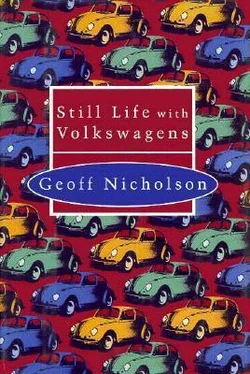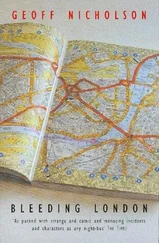Up ahead, standing in a lay-by with his thumb out, is some pathetic looking old geezer. “Hey,” Butcher says to the others, “this’ll be a laugh.” He stops the van and flings open the door for the hitchhiker. “Get in squire.” Even the most desperate and trusting of hitchhikers might be reluctant to get into a van containing eight drunken skinheads, but Charles Lederer simply says, “This isn’t a Volkswagen, is it?” They assure him it isn’t and he gets in.
Half an hour later, without stopping, they throw him out of the back of the van. He has been laughed at, mocked, abused, threatened and sprayed with beer. He has been slapped and kicked though not given a serious beating. His weakness, his inability to fight back, has saved him from that. But the skinheads have committed one unusual act of violence to his appearance; they have shaved his head. For all their practice, it hasn’t been done very skilfully. There are nicks and cuts on his scalp and there are a few tufts of grey hair that they have missed, but nevertheless, the point has been made.
Butcher drives on feeling somehow more whole after this shared act of comic aggression. Charles Lederer lies at the side of the road, his fingertips exploring his newly bared scalp. He does not look like a real skinhead any more than he looks like a certain kind of homosexual. If anything he looks like a victim of Nazi atrocities, which in a sense he is. But as he lies there on the ground with the lorries rolling by, he wonders if perhaps the time has come to cease being a victim.
♦
The skinheads arrive at a Little Eater family restaurant some way off the A6. At first they don’t go inside. It is one of those places with a children’s playground, with a climbing frame and a slide in the shape of a baby elephant. The skinheads soon scare off the children playing there and begin having their own robust fun all over the playground. They improvise a game of football with some empty beer cans, but it soon degenerates into rugby, into kick boxing, into all-in wrestling. A harmless Sikh family walk by and are jeered and sworn at. A couple of skinheads climb to the top of the slide and urinate so that a long, narrow waterfall of piss sweeps down it and cascades from the elephant’s trunk.
They are too occupied to notice the wicked-looking black Beetle parked beside the restaurant, and at first Barry, who is inside about to tuck into a ranch style ail-American breakfast, doesn’t really notice the skinheads either. But eventually he becomes aware of their raised voices and he looks at them through the window, and like everybody else in the Little Eater, he hopes they don’t come inside.
These hopes are not realised. They enter the restaurant. They don’t wait to be seated. Amid much effing and blinding they descend and sprawl across four tables, light up cigarettes in a non-smoking area and look around them, proud of their capacity to cause offence.
Some customers, the ones who have either finished their breakfasts or not yet ordered, decide to leave immediately. The ones who remain try to pretend that the skinheads are invisible, that there’s nothing untoward happening. Barry falls somewhere between these two camps. He can’t leave because he’s only just started his breakfast, but neither can he make the imaginative leap that would allow him to pretend that the skinheads aren’t there.
They meanwhile, after much difficulty, argument, high jinks and obscenity, manage to place an order with the waitress. Essentially they have ordered two of everything, with double orders of chips and extra grease. Now they discover the delights of the squeezable ketchup bottles and squirt each other with long red streams of tomato sauce. They also manage to squirt a family at the next table. The father, as meekly as possible, says, “Steady on now lads,” is sworn at savagely and immediately escorts his family from the premises. The place is emptying fast, the more so when the skinheads begin mooning and giving Nazi salutes. It is no time at all before the only customers still in the Little Eater are the skinheads and Barry. Barry tries to stay calm. He orders another pot of coffee from the waitress and it arrives soon enough, there being rather few other diners to be served.
It would be impossible to ignore the storms of anarchy and aggression bursting out on the other side of the restaurant, so Barry doesn’t try. He begins to watch the skinheads closely. It is not done out of idle curiosity. It’s an active, intrusive sort of watching and soon enough they become aware of Barry’s gaze. And then they start looking back, and then they get up from their tables and move over to Barry’s. They surround him. They’re very quiet now, the lull before all manner of storms.
“What are you looking at?” one of them asks.
“You,” Barry replies accurately enough.
“Why? You fancy us or what?”
“Yeah, he looks like a puff doesn’t he?”
“Looks a bit Jewish too.”
“And maybe he’s got a touch of the tar brush about him.”
One of them now stands close beside Barry, turns his back, shoves out his backside and farts wetly in the direction of Barry’s face.
Barry ignores this and says, “I’m staring at you because you’re spoiling my ranch style all-American breakfast.”
Even they see the funny side of that. They laugh like drains, or at least they pretend to. They enjoy Barry’s quip so much that two of them are moved to spit onto his plate where half his breakfast remains uneaten.
“And I’m thinking,” Barry continues without missing a beat, “you know, given enough time and enough love, I’m sure you people could be turned into decent, warm, likeable human beings. The problem is, I don’t have that amount of time. So why don’t you just go away and leave us all in peace?”
“Who’s us all? There’s only you here. You’re on your own, pal.”
“Ultimately we’re all on our own,” says Barry.
“You know,” says Butcher, “this guy’s really starting to fuck me off.”
“The feeling’s mutual,” says Barry, and in one movement he picks up the pot of coffee and hurls it so that a hot, black wave of coffee flies through the air at eye level and breaks across the faces of the nearest three skinheads. Barry is already up and running out of the Little Eater, out across the car park towards Enlightenment. The skinheads race after him and he only wins the race by a short head, but that’s enough. Now he’s in his car, locking the door, starting the engine. The skinheads are furious, delirious with rage. They beat on the windows, kick his doors, but he drives through them at speed, clipping at least one of them with his right front wing. They decide to give chase. They pile into their white van, seething, howling, spitting. Butcher takes the wheel. He shoves the key into the ignition, turns it savagely, floors the accelerator, and absolutely nothing happens. He keeps trying, becoming apoplectic with frustration. He beats his fist against the wheel, against the dashboard, against the roof. Finally he headbutts the windscreen. It hurts like Hell but he doesn’t mind that. There is still no starting the van’s engine. Barry and Enlightenment are now half a mile down the road.
“Christ!” says Butcher. “If only everything in life was as reliable as a fuckin’ Volkswagen.”
♦
After I wrote Street Sleeper people got the impression that I was ‘interested’ in Volkswagens. Sometimes I would protest about this and say that I was only interested in Volkswagens in the way that, say, Herman Melville was ‘interested’ in white whales. But most of the time I let it go. I found that a great many people had had a Volkswagen in their lives at one time or another, they’d owned one or driven one or learned to drive in one or had a boyfriend or girlfriend who’d owned one, and they were all very keen to tell me their Volkswagen stories. I was happy enough to listen, although at the time I had no idea that I’d ever be writing a sequel to Street Sleeper . Some were fairly ordinary motoring stories about breakdowns or difficult journeys or seductions or driving tests, but the following was in quite a different league. A man called Hilton Cunliffe was in Holland in 1945 with the British Army, driving out the Germans, gradually destroying the sites from which the sub-sonic VI and supersonic V2 flying bombs were being launched against Britain. Hilton was a traffic marshal and somehow he’d got his hands on a captured Schwimmwagen, the amphibious, military version of the Beetle. His job was simply to drive it back to HQ, but the vehicle wasn’t very healthy and it was a long slow journey. The road was rutted and very narrow, barely more than a single track, and a certain amount of other traffic was also using it, so that once in a while a faster-moving army truck headed in the same direction would come up behind him and be unable to get past. When that happened he’d pull the Schwimmwagen over to the side of the road and let the truck go by. This happened many times in the course of the journey, and after a while the pulling over became more or less automatic. As soon as he heard the sound of a truck behind him, he’d pull over without so much as looking round. This happened innumerable times.
Читать дальше












